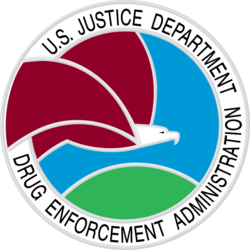DEA
 | |
| Formation | July 1, 1973 |
| Parent organization | US/DOJ |
| Headquarters | Arlington, Virginia |
| Subgroups | Special Operations Division |
| Interest of | Douglas Valentine |
| Subpage | •DEA/Administrator •DEA/Infiltration |
The Drug Enforcement Administration was established on July 1, 1973, by Reorganization Plan No. 2 of 1973, signed by Richard Nixon.
Contents
Interference from the State Department
Sibel Edmonds notes a recurrent pattern which applies to those drug sting operations by the DEA and/or FBI which threaten to capture high level drug traffickers. Apparently, the US State Department regularly gets such operations called off at the last minute by stating that the traffickers have diplomatic immunity and that they must not be arrested, for fear of causing a diplomatic incident. As she notes, this is suggestive not only of deep state involvement in the global drug trade, but also of mass surveillance used in real time to monitor the actions of selected individuals.[1]
Call Tracking
In 2015 it emerged during a court case that the DEA had secretly kept a vast database of American phone calls to foreign countries for over a decade. They claimed that the programme had been stopped.[2]
Related Quotation
| Page | Quote | Author | Date |
|---|---|---|---|
| Parallel Construction | “A secretive U.S. Drug Enforcement Administration unit is funneling information from intelligence intercepts, wiretaps, informants and a massive database of telephone records to authorities across the nation to help them launch criminal investigations of Americans.
Although these cases rarely involve national security issues, documents reviewed by Reuters show that law enforcement agents have been directed to conceal how such investigations truly begin - not only from defense lawyers but also sometimes from prosecutors and judges. The undated documents show that federal agents are trained to "recreate" the investigative trail to effectively cover up where the information originated, a practice that some experts say violates a defendant's Constitutional right to a fair trial. If defendants don't know how an investigation began, they cannot know to ask to review potential sources of exculpatory evidence - information that could reveal entrapment, mistakes or biased witnesses.” | John Shiffman Kristina Cooke | 5 August 2013 |